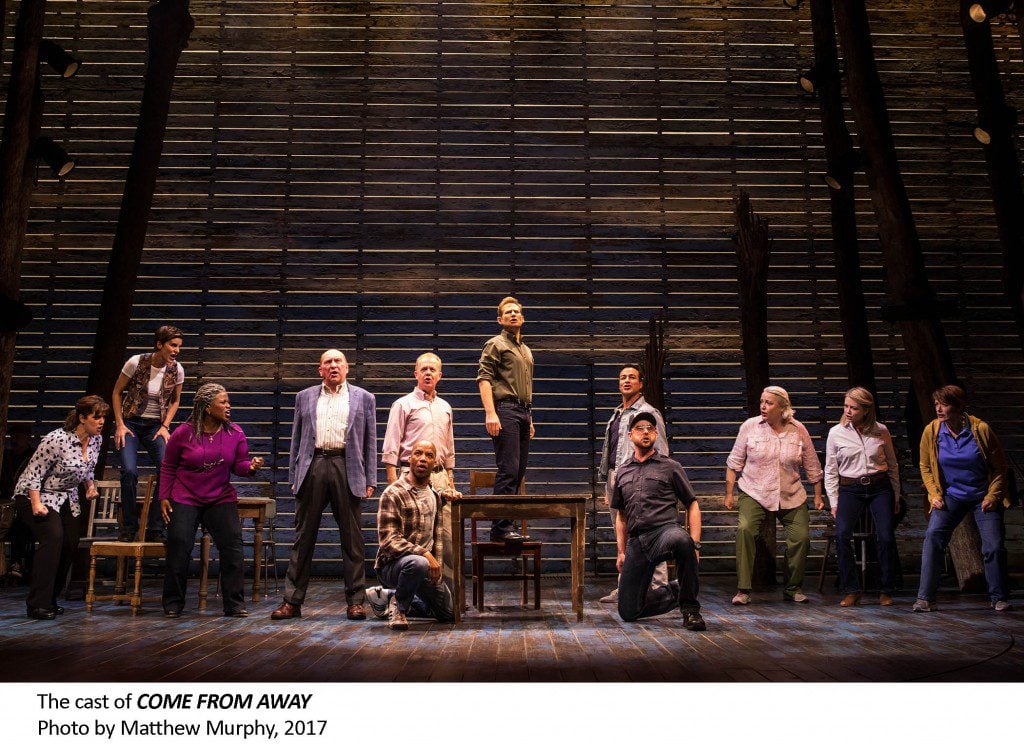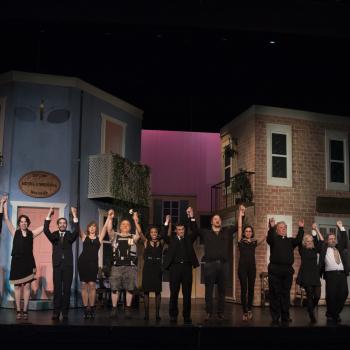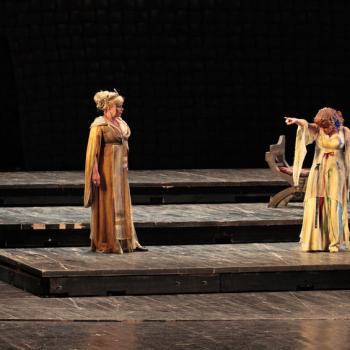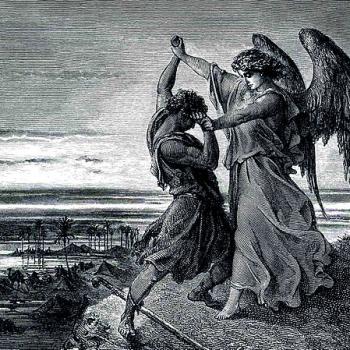Scene: a frightened man from Africa on a bus with his wife in rural Newfoundland, being taken to who-knows-where from a plane that landed far from its destination. They come to a camp full of people in military uniforms. The bus driver stops, and motions for the passengers to get off the bus. The man doesn’t move. He does not understand the bus driver’s language. He does not trust him. And then the bus driver points to the Bible that the man’s wife is clutching. She hands it to him nervously. He flips to Philippians and points at chapter 4, verse 6. “Be anxious for nothing.” This man is a Christian. These are friends. They are safe. Now they’re talking the same language.
Is this a scene from a far-fetched Christian novel? Nope – it really happened. And it is now a part of the new Broadway musical Come From Away, which tells the true story – sometimes using verbatim dialogue from the people who lived it – of how the residents of the tiny town of Gander, Newfoundland welcomed 7,000 airline passengers who were forced to land there when U.S. airspace closed on 9/11.
The show is wonderful. It beautifully captures both the fear and anxiety of that terrible day, and the feeling of camaraderie and support that were born in its immediate aftermath. The show is by turns tense, funny (it had far more laughs than I expected), joyful, and sad. Ben Brantley captures the spirit well in his New York Times review, as does Johnny Oleksinki in his New York Post review.
What both of those reviewers – and most others – highlight is how vital the message of welcoming strangers is in today’s political climate. I think they’re right, but I also hope that conservatives aren’t turned off by an over-politicizing of the show. Despite what could be seen as some liberal leanings (e.g. focusing in part on the story of a gay couple, emphasizing multiculturalism and interfaith connections), the show is not really a political statement. If anything, it is a show that highlights the compassionate humanity of small-town folks who, if they were American, might be written off as close-minded red staters. These are the stereotypes that some of the “come-from-away” passengers have to overcome.
It’s not a religious show, but I was especially impressed by the way the show handled faith. As it turns out, those uniformed people who the African man saw from the bus were Salvation Army workers (“We rarely use ’em, but everyone’s dusted off their Salvation Army uniforms to welcome these people!”). The show makes it clear that communities of faith, like the Salvation Army and other local churches, played a key role in the efforts to house and feed the influx of guests. They weren’t the only ones, of course – but I count it as praiseworthy that the show’s writers didn’t shy away from acknowledging their part.
There’s another beautiful scene, where a Newfoundlander brings an American to church and they add their voices to the Prayer of St. Francis, which is being sung by a man who had lost touch with his childhood faith. The music of that hymn merges with the singing of “Oseh Shalom,” a Jewish Hebrew prayer for peace, and then prayers of different people of faith. I don’t subscribe to the notion that all religions are the same, but I do believe that all grasp something of the truth and that all have goodness in them – and this song highlights the bonds shared by people of faith, even if that faith differs.
This doesn’t mean the show ignores the very real religious tensions that were exacerbated on 9/11. A Muslim passenger finds sympathy and compassion from a few people, but even as the planes take off after five days on the ground, most of the other passengers continue to view him with suspicion. To me, the realism there – and the unspoken reality that some sort of religion did inspire the terrorists of 9/11 – only serves the reinforce the truth of the more positive side, that there is a way in which we are all bound together by faith, that there is something believers have in common with everyone else who is looking for meaning outside of themselves.
I could go on and on about the show, but since I’m a minister rather than a theatre critic, I’ll stop there. What I hope is that conservatives and liberals alike, religious and non-religious, will see this show. Or, since going to Broadway shows isn’t exactly an easy option for most people, at least that they will listen to the soundtrack (be forewarned that it does contain some profanity). There is a divide in our country between liberals and conservatives, Republicans and Democrats, Evangelicals and Progressive Christians. But the divide that worries me more is a growing divide I see between people who think the other side is still worth listening to and talking to, and people who think the time for dialogue is done. I place myself firmly in the former camp, and I hope that if nothing else, this show helps remind all of us of the common humanity we share – even with people who are as different from us as a small-town Catholic schoolteacher is from a Muslim world-class chef, as a Texan mother is from an English businessman, as a born and bred Newfoundlander is from a come-from-away.
UPDATE: “Oseh Shalom” is sung by a rabbi who landed with one of the planes, and it turns out that if anything that part of the true story is more dramatic than it is in the show. Amazing.
UPDATE 2: The writers, Irene Sankoff and David Hein, talk about the religious aspects of the show at 25:08 in this Guggenheim Works & Process video:













